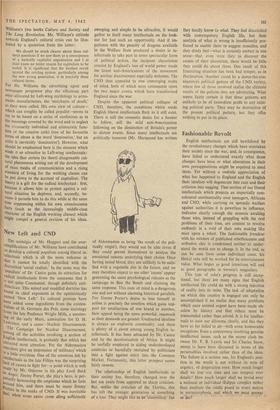Fashionable Revolt
English intellectuals are still bewildered by the revolutionary changes which have overtaken their society since the war, and, in consequence, have failed to understand exactly what those changes have been or what alterations in their own presuppositions might be required to meet them. Yet without a realistic appreciation of what has happened to England and the English their idealism will degenerate into cant and their criticism into nagging. That section of our liberal intellectuals which projects an impartially rose- coloured sentimentality over teenagers, Africans and CND, while carrying on sporadic warfare against authorities it is powerless to influence, indicates clearly enough the nemesis awaiting those who, instead of grappling with the real problems of their time, are content to revolve endlessly in a void of their own making like mice upon a wheel. The fashionable frondeur with his mixture of publicised rebelliousness and orthodox chic is condemned neither to under- stand the world nor to change it. In the end, as can be seen from some individual cases, his liberal vein will be worked for its entertainment value. What began as good intentions will end as good paragraphs in women's magazines.
This type of rake's progress is still excep- tional, but there are many signs that English intellectual life could do with a strong injection of reality into its veins. The task of adaptation on which this country is engaged can only be accomplished if we realise that many problems which once seemed urgent have been made ob- solete by history and that others must be transcended rather than solved. It is for intellec- tuals to state our dilemma clearly, and this they have so far failed to do—with some honourable exceptions. Even a controversy involving genuine intellectual issues, such as the recent clash be- tween Dr. F. R. Leavis and Sir Charles Snow, seems to have been discussed in terms of the personalities involved rather than of the ideas. The failure is a serious one, for England's posi- tion in the world is not without its note of urgency, of desperation even. How much longer shall we lose our time and our tempers over details? How much longer shall we brood over a national or individual tEdipus complex rather than meditate the riddle posed to every nation in metamorphosis, and which we must answer or die?






































 Previous page
Previous page